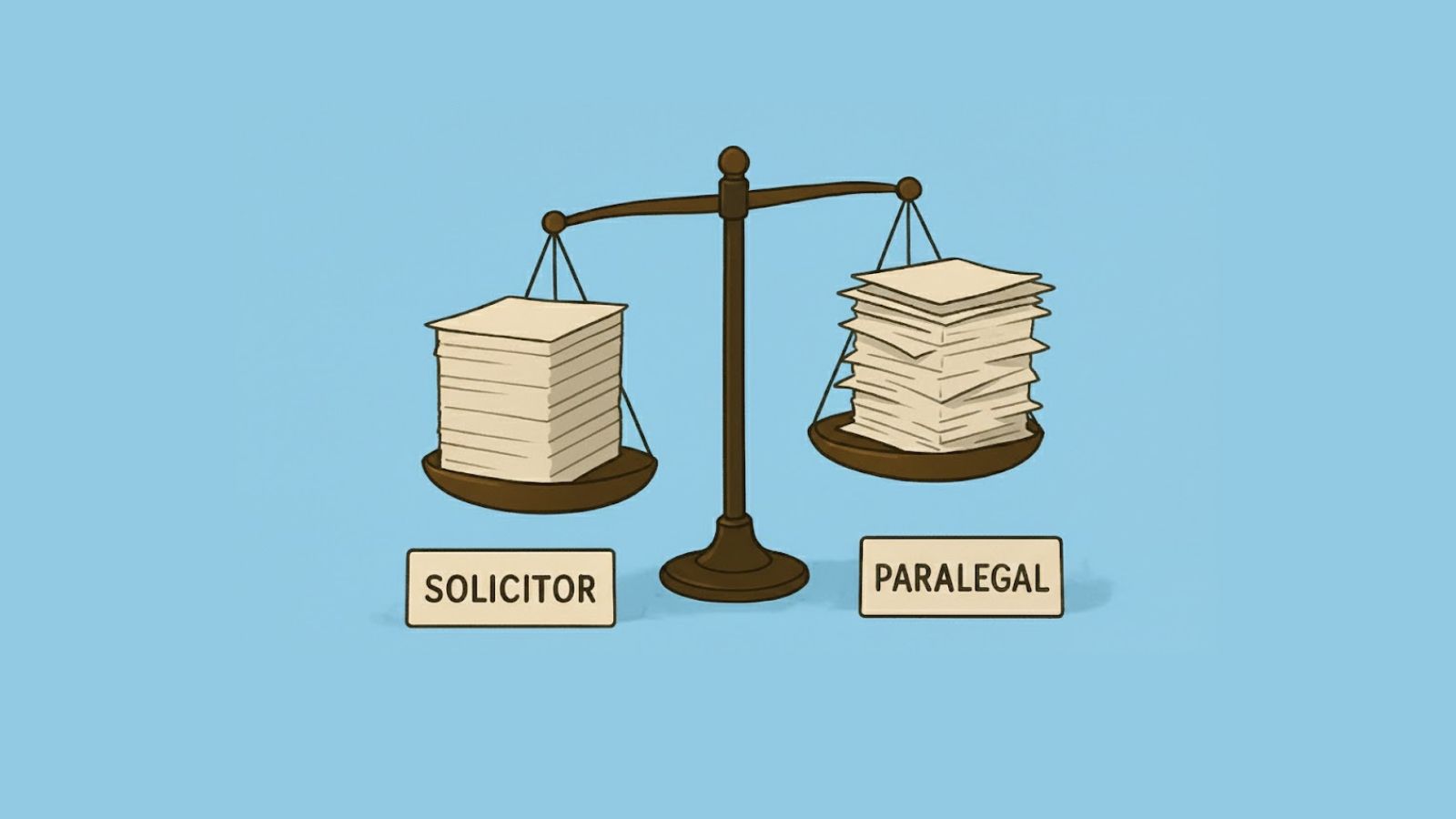- LittleLaw
- Posts
- 🧾 Mazur explained: Litigation just got pricier
🧾 Mazur explained: Litigation just got pricier

Together with
Table of Contents
If you take just one thing from this email...
The High Court has made clear that only qualified solicitors can run litigation — paralegals and other unqualified staff can help, but they can’t manage a case themselves.
This changes how a lot of law firms operate, especially those relying on paralegals for routine legal work.
It also creates real uncertainty for the SRA, education providers, and firms trying to follow the rules on who can legally conduct litigation.

EDITOR’S RAMBLE 🗣
It’s “back to school” season 😭
That means we’re recruiting for our LittleLaw Campus Ambassadors (it's a paid role).
So, if you (1) like LittleLaw, and (2) go to a UK university, fill out this form.
The deadline to apply is 6pm on Monday 13 October (no extensions)
– Idin

FEATURED REPORT 📰
🧾 Mazur explained: Litigation just got pricier

What’s going on here?
A recent High Court ruling in Mazur v Charles Russell Speechlys has shaken up how law firms use their paralegals. The court decided that law firm staff who aren’t qualified solicitors can help with litigation, but they can’t run litigation themselves.
This decision has confuses a lot of paralegals. Some aren’t sure if they can keep doing parts of the work that they’ve been doing for years.
What was this about?
Charles Russell Speechlys, a major City law firm, did some legal work for two clients, Julia Mazur and Jerome Stuart. When they didn’t pay their £54,000 bill, the law firm hired Goldsmith Bowers Solicitors to recover the debt.
When Goldsmith Bowers filed a claim in court, the main legal document (called the particulars of claim) was signed by Peter Middleton, the firm’s head of commercial litigation.
The problem was that Peter Middleton wasn’t a practising solicitor. He had been suspended in 2008 and never got his practising certificate back. When Goldsmith Bowers later hired him, they even needed special permission from the Solicitors Regulation Authority (SRA) — the regulator for solicitors — to employ him.
Mazur and Stuart found out about this and argued that Middleton wasn’t legally allowed to run the case. They said only authorised solicitors can conduct litigation — and Middleton wasn’t one.
The case reached the High Court, which had to decide whether someone like Middleton could legally conduct litigation.
What does the law say?
The Legal Services Act 2007 explains which legal tasks only qualified professionals are allowed to do. These are called “reserved legal activities”.
They include:
Speaking in court (known as exercising the right of audience).
Running a legal case (called conducting litigation).
Handling someone’s estate after death (probate work).
Authenticating or witnessing legal documents (notarial work).
Swearing people in for legal purposes (administering oaths).
According to Section 18, only certain people or organisations can do these tasks:
Authorised persons: Qualified lawyers, such as solicitors approved by the SRA or barristers approved by the Bar Standards Board.
Authorised bodies: Licensed organisations, like law firms or Alternative Business Structure (ABS) providers, including legal arms of the Big Four accounting firms.
In short, only authorised lawyers or licensed firms can carry out reserved legal activities.
What was argued?
Goldsmith Bowers argued that Peter Middleton could carry out reserved legal work because their firm was authorised to do so.
But the law says that being employed by an authorised firm isn’t enough. The individual doing the work must also be authorised (or covered by a legal exemption).
Exemptions only apply in specific cases — for example, civil servants acting in their official role or people representing themselves in court.
Peter Middleton didn’t fit any of those categories. He wasn’t an authorised solicitor, and he wasn’t exempt.
What did the judge decide?
Mr Justice Sheldon ruled that people who aren’t authorised lawyers, like Peter Middleton, cannot carry out reserved legal work. This applies even if they work for an authorised firm or are supervised by a qualified solicitor.
They can help with the work, but they can’t do it themselves. In other words, non-qualified staff can support an authorised lawyer, but not conduct the legal activity on their own.
Why has this caused so much confusion?
❌ The ruling contradicts earlier SRA guidance: Before this case, the SRA had looked into Peter Middleton’s work at Goldsmith Bowers and decided not to investigate. That decision implied the regulator thought his actions were lawful.
The High Court’s judgment now says the opposite — that non-authorised staff can’t conduct litigation, even under supervision. This directly challenges the SRA’s earlier position and raises questions about why it previously took no action.
For law firms, this is confusing. If the regulator itself didn’t see a problem before, it’s unclear what firms are meant to do differently now.
📚️ The SQE guidance adds to the problem: The SRA tells aspiring solicitors that providing legal services, which can include work on reserved legal activities, can count as qualifying work experience for the SQE.
But SQE candidates aren’t authorised lawyers. This means the SRA’s own guidance could encourage people who aren’t authorised to take part in reserved legal activities — the very thing the court says they can’t legally do.
The contradiction leaves firms and trainees unsure where the boundary lies.
🤔 Conflicting messages from other regulators: CILEX, which oversees Chartered Legal Executive qualifications, added another layer of confusion. Until 2023, it told members that they could conduct litigation if employed by a law firm.

CILEX gave the wrong advice on its website
But CILEX members aren’t authorised under the Legal Services Act to conduct reserved legal work. So, they can assist, but not lead cases.
This shows that even professional bodies have misunderstood what non-authorised staff are legally allowed to do. The ruling now makes it clear — but it also exposes how widespread the misunderstanding has been.
So what exactly counts as “conducting litigation”?
That’s part of the problem — no one’s entirely sure.
The Legal Services Act says that “conducting litigation” includes:
issuing court proceedings,
running or defending those proceedings, and
doing related or “ancillary functions”.
The first two are clear enough. But “ancillary functions” could mean almost anything connected to a case — from drafting documents to managing correspondence.
Mr Justice Sheldon said it depends on the facts of each case. But that leaves law firms in an awkward position — they need to decide how much paralegals can safely do without crossing a line that isn’t clearly marked.
Why should law firms care?
💼 It limits what paralegals can do: Many law firms rely on paralegals (especially in areas like debt recovery, personal injury, and conveyancing). Paralegals are cheaper to employ than solicitors, and experienced ones often manage their own caseloads under a solicitor’s supervision.
This ruling could change that. Firms will now need qualified solicitors to handle those tasks. That could increase costs and reduce efficiency. Clients may resist higher fees for work that was previously done by paralegals at a fraction of the price.
🧾 Challenges are already reaching the courts: Since the judgment, some losing parties have argued that firms’ costs should be thrown out entirely because unqualified paralegals “illegally” conducted litigation. These claims haven’t been fully tested yet, but courts are already seeing them crop up in cost assessments.
There are limits, for now. Cases that settle before court proceedings likely aren’t affected. Fixed-cost cases shouldn’t change much either, since the fees are capped regardless of who did the work. And in practice, proving exactly who did what — and whether it counts as “conducting litigation” — will be messy and difficult to enforce.
Still, the risk is real. The Mazur decision has triggered what some are calling a “costs war.” Firms could now face major challenges when trying to recover their fees if paralegals were heavily involved in the case.
📨 Clients could also challenge past work: Unhappy clients could use this ruling to question previous cases — particularly if they lost. They might argue that unauthorised staff conducted their litigation and complain to the regulator or even sue the firm.
Even if these claims don’t succeed, they can still damage a firm’s reputation and take time and money to defend.
🕵️ There’s a risk of regulatory action: The SRA might decide to review cases where paralegals have carried out reserved legal work in the past. In reality, enforcing this could be difficult, since many firms have long relied on paralegals to do these tasks.
Still, the possibility of regulatory action remains a risk firms can’t ignore.
🚨 The consequences are serious: If someone who isn’t authorised conducts litigation, it’s not just a breach of rules — it could amount to contempt of court or even a criminal offence.
This judgment clarifies what the law says but exposes how uncertain it remains in practice. Law firms now need to rethink how they use paralegals, how they recover costs, and where to draw the line between support and responsibility.

TOGETHER WITH ALLABOUTLAW* 🤝
Join the UK's biggest Virtual Law Fair
The AllAboutLaw Virtual Law Fair brings together 50+ leading law firms and law schools, tons of live sessions and panel discussions, and a community of 10,000+ aspiring lawyers just like you.
Meet firms, hear directly from recruiters and trainees, get practical insight to sharpen your applications and build connections to back it up.
Oh and it’s totally free.
Have you secured your place at the UK’s biggest Virtual Law Fair?
* This is sponsored content

IN OTHER NEWS 🗞
🎮 A record-breaking $55 billion deal is taking Electronic Arts (EA) private — it’s the biggest private equity buyout in history. Kirkland & Ellis is leading for the buyers, with help from Gibson Dunn, Latham & Watkins, Simpson Thacher, and Sidley Austin. Wachtell is advising EA.
👜 Prada has officially been cleared to buy Versace after approval from the European Commission. The €1.25 billion deal, expected to close by the end of the year, marks a major shift for Versace — whose sales have dropped 15%. The new creative director, Dario Vitale (formerly of Miu Miu), is already reshaping the brand’s style, while Prada plans to boost marketing, refine stores, and grow sales in Asia and the US.
🤖 Kennedys has teamed up with AI platform Spellbook to launch a new training programme preparing junior lawyers for the AI era. As automation replaces early-career tasks like contract drafting and document review, the programme will teach lawyers how to work alongside AI while developing core legal judgement and skills. Using simulated exercises and AI-assisted drafting, trainees will get real-time feedback similar to mentoring from senior lawyers.
💭 A new report by LawCare warns that the legal profession is facing a wellbeing crisis. Nearly 60% of respondents to the Life in the Law survey said they have poor mental wellbeing, and half reported frequent anxiety. Over three-quarters regularly work beyond contracted hours, and one in five have faced bullying or discrimination.

AROUND THE WEB 🌐
🔮 Wild: This site tracks every failed apocalypse prediction (and counts down to the next one)
📚 Fascinating: The most complicated word in the English language is “run” — it has 645 different meanings
🎮 Chaotic: Try to cancel your membership (took me 54 seconds)

STUFF THAT MIGHT HELP YOU 👌
📹️ Free application help: If you're applying to commercial law firms, check out my YouTube channel for actionable tips and an insight into the lifestyle of a commercial lawyer in London.
How did you find today's newsletter? |

